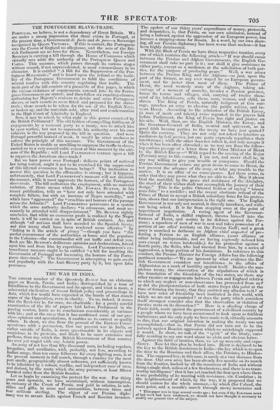THE PORTUGUESE SLAVE-TRADE.
PORTUGAL, we believe, is not a dependency of Great Britain. We are under a strong impression that there exists in Portugal, at the present time, a Government de facto and de fare—a Sovereign recognized by Queen VICTORIA. If this is correct, the Portuguese owe the Crown of England no allegiance, and the acts of the Bri- tish Parliament arc no laws far them. Nevertheless, our Foreign Secretary is carrying a bill through the House of Commons which virtually sets aside the authority of the Portuguese Queen and Cortes. This measure, which passes through its various stages without remark, if not unprecedented, is most extraordinary in its character. It is entitled "A Bill for the Suppression of the Por- tuguese Slave-trade ;" and is based upon the refusal or the inabi- lity of the Portuguese Government to fulfil the conditions of
several treaties with this country regulating that traffic. The main part of the bill consists of a preamble of five pages, in which the various violations of engagements entered into by the Portu- guese Government are stated ; and then follow six enacting-clauses, authorizing her Majesty's cruisers to detain and seize Portuguese slavers, or such vessels as seem fitted and prepared for the slave- trade ; those vessels to be taken for the use of the English Navy, or broken up, and the materials sold, after trial and condemnation in the High Court of Admiralty in England.
Now, it may be asked, by what right is this power exercised by the British Parliament ? The old fashion of compelling fhltilment of engagements by a recusant party to a treaty, was to attack him by open warfare, but not to supersede his authority over his own subjects, in the way proposed by the bill in question. And were Portugal powerful instead of weak, it would be utter madness to enforce the principle of this measure. The Government of the United States is unable or unwilling to suppress the traffic in slaves, carried on to a very considerable extent at this moment by the citi- zens of the Republic : will Lord PALMERSTON venture upon a bill to suppress the American slave-trade ? But we have power over Portugal : delicate points of national law being waived, ought it not to be exercised fin. the suppression of this iiifernal commerce in human beings ? The inclination to answer this question in the affirmative is strong ; but it happens, unfortunately, that Lord PALMERSTON'S measure will not diminish the amount, while it must aggravate the horrors, of the Portuguese slave-trade. The bill authorizes the employment, with no material variation, of those means which Mr. Fownia, BUXTON, in his recent publication, tells us " have not only been attended with complete failure, but. with an increase of Negro mortality," and which have "aggravated" the "cruelties and horrors of the passage across the Atlantic!" Lord PALMERSTON perseveres in a system which the same authority declares "is erroneous, and must ne- cessarily be attended with disappointment." Mr. llexTms rightly concludes, that while an enormous profit is realized by the Negro trade, it will be carried on in spite of British cruisers. Av, and although "all nations shall have acceded to the Spanish treaty, and that treaty shall have been rendered more effective" by
"linking to it the article of piracy "—though you have " the cordial concurrence of the authorities at home and the populace in the Colonies—the contrabandist will yet baffle and defeat you.
Such arc Mr. BUXTON'S deliberate opinions and declarations, forced upon him and from him by experience. Lord Pansmus-roses ex- traordinary measure ought to be entitled "a bill for insulting the Government of Portugal and increasing the horrors of the Portu- guese slave-trade." The Government is attemptine.° to gain credit and popularity with the Anti- Slavery party by it, but upon fidse pretences.


























 Previous page
Previous page